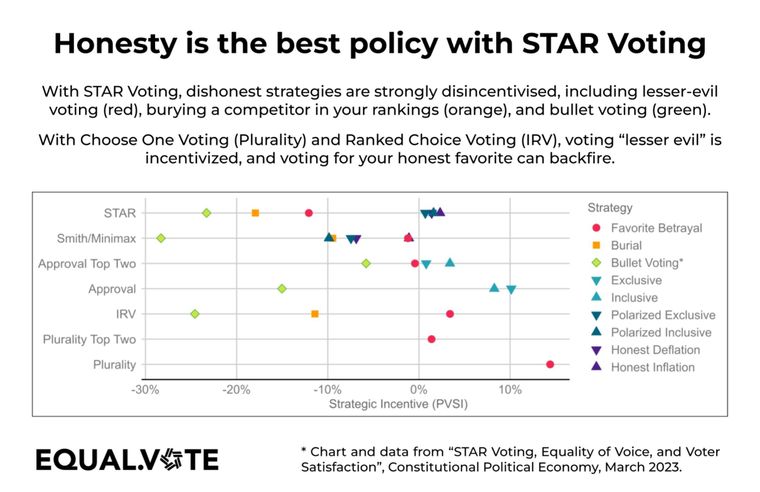@cfrank I have been thinking about the same questions. I think that the safeguard to fascism is ensuring checks against polarizing factions taking control.
In FPTP two party domination, the center-squeeze effect ensures that over time the two opposing factions become more and more polarized and this gives the illusion of majoritarianism, but as we know, the electability bias from voters having to vote for the frontrunner on their side can wildly inflate the perceived popularity of those frontrunners. In practice the moderate and third party voices are silenced and we see super polarizing candidates like Donald Trump (who initially only had some 25% of the vote in the 2016 primary) winning decisive control of their party. His own party has little they can do if they don't like his leadership, and the opposing party also has no leverage whatsoever if they can't beat him head to head. This last presidential election we saw both parties put forward candidates with record low approval ratings, but nobody else had a chance of challenging them at the same time. This is textbook polarized entrenched two party domination.
Meanwhile, I'm not convinced that a multi-party system on it's own will address any of that and it could make it worse. Just as choose one ballots can create a center-squeeze in FPTP, they can do the same in PR, resulting in a donut of polarized factions represented and little to no representation for the middle. In an election where the quota to win is 10% for example, a candidate could theoretically be strongly opposed by 90% of the electorate. Meanwhile, other factions could win with their standard-bearer also preferred by 10% of the electorate, but also strongly supported by many more and only strongly opposed by a slim minority.
When some winners are hyper-polarizing and others are not, it not only allows for the rise of dangerous factions who are more likely to bring about civil war, it also creates a lopsided and unstable winner-set. That's not the idealized definition of proportionality we're aiming for even though it would technically pass PR criteria. Theoretically, we should be able to do better.
The magic of a more expressive ballot or especially a 5 star ballot is that voters can show not only who their favorites are, but how much they like and dislike candidates from other factions. In an ideal system, this data could then be used to:
a) ensure that factions who deserve a seat at the table get one, and
b) ensure that candidates or factions that are seen as dangerous and harmful by others are not platformed when better alternatives exist.
In single-winner STAR, voters who are in the minority who are not going to get their favorites elected still have a strong vote against their worst case-scenario in the runoff. This is a massive check on authoritarianism and fascism. This is amazing and we don't need to switch to PR to get this windfall.
And, in a top shelf 5 STAR-PR system, theoretically we could do the same, using scores to identify which candidates and factions meet quota rules, while using scores and runoffs or preference data to identify the most polarizing and most opposed candidates.
At best, PR systems boast that legislatures where all perspectives are represented at the table. These legislatures are more likely to put forward more broadly acceptable legislation, but at their worst, they can give extremist factions massive leverage to cause stagnation or tear the system apart from the inside. For example, a super polarizing candidate like Israel's Ben Gvir who was elected with only 3.5% of the vote has the power to make or break the majority coalition and call a new election with a vote of no confidence if Netanyahu defies him. At worst, PR systems can give small polarizing factions extremely disproportionate leverage. Some of this can only be reformed with governmental system reforms such as higher quotas, but some of it can be fixed with the voting method itself.
Again, I think with a more expressive ballot and a hybrid ordinal and cardinal (STAR) approach we can do better.
